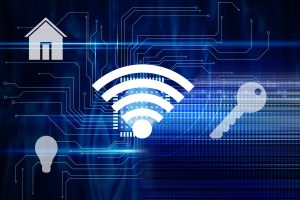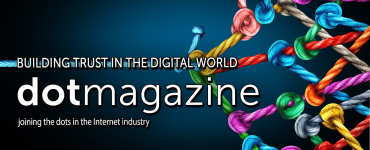A Smart Home can significantly increase the security of the property and the residents but can also pose new challenges for the users. Smart Home solutions are designed to make the lives of users safer and more comfortable while increasing the quality of life and living and making it more efficient.
Smart Home
The Smart Home segment includes all connected devices used in a living space. This includes systems and solutions from the areas of:
Home automation technology, such as
- Automatic opening and closing of doors, windows and roller shutters
- Control of heating
- Control of air conditioning systems
Security systems, such as
- Alarm systems
- Surveillance cameras
- Smart door locks
Household appliances, such as
- Robot vacuum cleaners
- Refrigerators
- Smart TVs
- Speakers with voice assistants
- Lawn mowing robots
Networking in the Smart Home offers potential entry points
Many IoT devices are connected to each other and to the Internet. Therefore, the same risks and IT security requirements apply to them as to computers and smartphones.
This is because the networking of different devices and systems in the Smart Home offers hackers and cyber criminals potential points of attack and different gateways.
Protection against burglaries and hackers in the Smart Home?
Holiday time is burglary time, a Smart Home supports with appropriate security systems, such as alarm systems, smart door locks and surveillance technology. However, vulnerabilities in Smart Home solutions are also becoming increasingly apparent. Jan Wendenburg, CEO, ONEKEY, explains in an interview how to secure your Smart Home solutions and the integrated connected IoT devices.
Security in the Smart Home – Jan Wendenburg in an interview
eco: Some of the German federal states are still on summer holiday. This means either handing over the house key to trusted neighbours who will look after things while you’re away, or independently monitoring your home from your distant holiday destination thanks to smart surveillance technology. What do you think is smarter/more advisable?
Jan Wendenburg: The trusted neighbour who looks after things has worked well over the last hundreds of years and is, in my opinion, always the first choice. Unfortunately, not everyone always has a neighbour like that, or they are away themselves. In this case, for lack of alternatives, we used to simply accept the risk that no one would look after things. Today we can do the same. For those who want or need to be in the know, modern Smart Home cameras with network or internet connection are generally a good choice. As far as security is concerned, you should go for brand-name products.
eco: Intelligent surveillance technology is supposed to make the home safe. However, in the worst-case scenario, cameras can also be hacked and used by strangers to get an initial impression of my home or to gain access via the manipulated smart garage door opener. What can I do as a consumer in concrete terms to protect my Smart Home as best as possible against attacks?
Wendenburg: The basic principle always applies: systems or devices that do not exist cannot be hacked. This means that if I equip my home with additional Smart Home devices, I usually get additional comfort – but I also get additional risk. To reduce this risk, generally, only brand-name products should be used and certain Smart Home solutions can also be operated “offline”, i.e. I can also control my blinds, shutters or lights in the house smartly – access or control from outside is then not possible. This reduces the risk considerably.
If “offline” is not an option, e.g. because it is absolutely necessary to control a device while on the move, then only reliable products from well-known manufacturers should be used. Here, consumers should inform themselves on the Internet and via tests and user reports before making a purchase.
eco: Smart Home solutions help save energy and reduce consumption costs at the same time. A topic that is currently on the minds of homeowners and tenants alike. However, data protection can sometimes be an obstacle for consumers. Are there any seals of approval or certificates, tips that consumers should use as a guide when selecting smart home solutions?
Wendenburg: Unfortunately, as far as I know, there is no binding, cross-manufacturer seal of approval in this area. Basically, all German manufacturers and manufacturers with headquarters in Germany are very clearly committed to strict German and European data protection, i.e. the GDPR, and can also be held liable in Germany. This is usually a strong motivation for manufacturers to also comply with the GDPR. Manufacturers abroad are also subject to these rules – however, liability is often difficult to enforce in the event of a case.
eco: From your point of view, where do we stand as experts in the field of IT security and smart home solutions?
Wendenburg: Currently, we are no longer at the very beginning, the GDPR has already made a difference. The brand manufacturers, especially the German ones, have improved a lot and recognised that data protection and IT security are also a sales argument. So we are already moving in the right direction.
eco: What optimisations are needed to make the Smart Home of the future even more secure?
Wendenburg: Smart Home devices are often too complicated to set up and operate, and then there are also very different devices, interfaces and communication – often each device or manufacturer has its own app.
Variety makes it complicated and insecure. The future Smart Home “Matter” standard is supposed to bring some relief here, especially to standardise the communication between the devices and apps. I am convinced that this is the right direction and if the manufacturers then perceive security even more strongly as a competitive advantage, the operation of Smart Home solutions will become easier and more secure for users in the future.
Conclusion
Regardless of which area of one’s home is to become smart – whether to increase one’s own security, to increase comfort or to use energy more efficiently – it is important to be thoroughly informed in advance. In addition to user and test reports, it also makes sense to think about which solutions actually need to be used “online”. The more devices are connected to the Internet, the more potential entry points there are for hackers. For Smart Home systems that absolutely have to be “online”, IT security precautions should be taken in advance, and the network at home should be secured.




